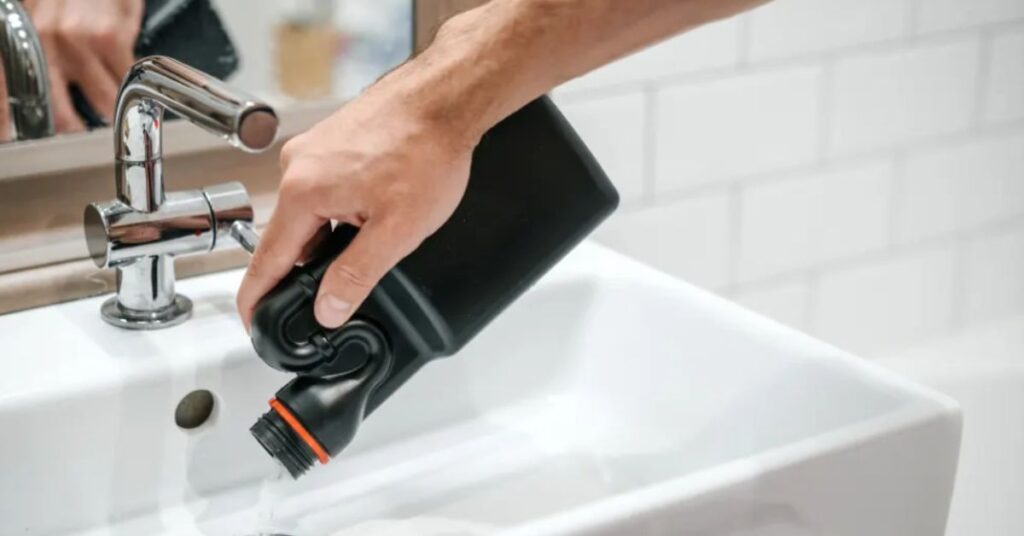Chemical drain cleaners offer a convenient solution for slow drains or stubborn clogs. It doesn’t help that mainstream media through commercials make it look so easy—just pour it in and watch the magic happen before your eyes. But have you ever stopped to consider the impact those harsh chemicals can have on your plumbing and sewer system over time? While they might offer temporary relief, the long-term consequences can be far more damaging than you’d expect.
Let’s explore how chemical cleaners affect your pipes and why professional drain cleaning in Rancho Cordova, CA, remains the best solution for your home’s plumbing system.
The Immediate Impact: Quick Fix, Bigger Problem
There is no doubt that chemical drain cleaners are potent. They contain strong, corrosive substances designed to break down clogs quickly. Most commercial cleaners use ingredients that can effectively dissolve hair, soap scum, and grease. But here’s the catch: while these chemicals might clear the clog, they’re also wreaking havoc on your pipes.
Over time, the repeated use of chemical cleaners weakens your plumbing. The powerful acids in these products don’t just eat away at the clog; they also erode your pipes. If your home has older pipes, the risk is even greater. The chemicals can accelerate corrosion, causing leaks, cracks, and—worst of all—major pipe damage. So while it might feel like you’re saving time by using a chemical cleaner, you could actually be setting yourself up for a costly repair later on.
How Chemical Cleaners Harm Your Pipes
It’s important to remember that your plumbing system isn’t just made up of metal or plastic pipes. There are also rubber seals, gaskets, and other components that are crucial for keeping everything running smoothly. Chemical drain cleaners don’t discriminate—they’ll corrode everything they touch. This can lead to deteriorating seals, which means more leaks and potential water damage.
Even if you don’t notice immediate signs of damage, the constant exposure to chemicals is breaking down your plumbing infrastructure bit by bit. If your home has copper or galvanized steel pipes, these materials are particularly susceptible to corrosion from harsh chemicals. The result? Premature aging of your pipes and an increased likelihood of needing a full pipe replacement sooner than you’d like.

The Environmental Impact: Where Do These Chemicals Go?
When you flush chemical cleaners down the drain, they don’t just disappear. They travel through your home’s plumbing system and eventually make their way into the sewer system. Once there, the environmental impact becomes a concern. The chemicals in drain cleaners are toxic and can harm local water supplies, soil, and ecosystems.
Although sewer systems are designed to handle a variety of waste, experts from a drain cleaning company will tell you that they aren’t built to neutralize harmful chemicals. As these cleaners pass through treatment plants, they can disrupt the natural balance of bacteria that help break down waste. This creates a chain reaction, where more pollutants end up being discharged into rivers, lakes, or oceans. By using chemical cleaners, you could unintentionally contribute to water pollution, endangering both wildlife and the environment.
Sewer Line Damage: An Unseen Threat
While the damage chemical cleaners cause to your pipes is often more visible, the harm they do to your sewer line can be even more significant—and more difficult to detect. Your sewer line plays a crucial role in transporting wastewater away from your home, but it’s also vulnerable to the effects of corrosive chemicals. When chemical cleaners travel through your plumbing and into the sewer line, they can erode the walls of the pipe, leading to cracks, blockages, and even complete collapse in extreme cases.
Because sewer line issues often occur underground, you might not notice the damage until it’s too late. By the time you start experiencing backups, slow drains, or strange odors, the damage may already be severe. Repairing or replacing a damaged sewer line is a major, expensive project that could have been avoided with proper care of your plumbing system.
Another key preventive measure is seeking help from drain cleaning services. A trained technician can use specialized equipment to clean out your pipes without the need for harsh chemicals. This helps keep your system in peak condition while avoiding the risks associated with chemical cleaners.
Your plumbing system is one of the most important—and often overlooked—parts of your home. Chemical drain cleaners may offer a quick fix, but they come with long-term consequences that can damage your pipes, harm the environment, and lead to costly repairs. Choosing safer, more sustainable alternatives will protect your plumbing and keep your home running smoothly.






